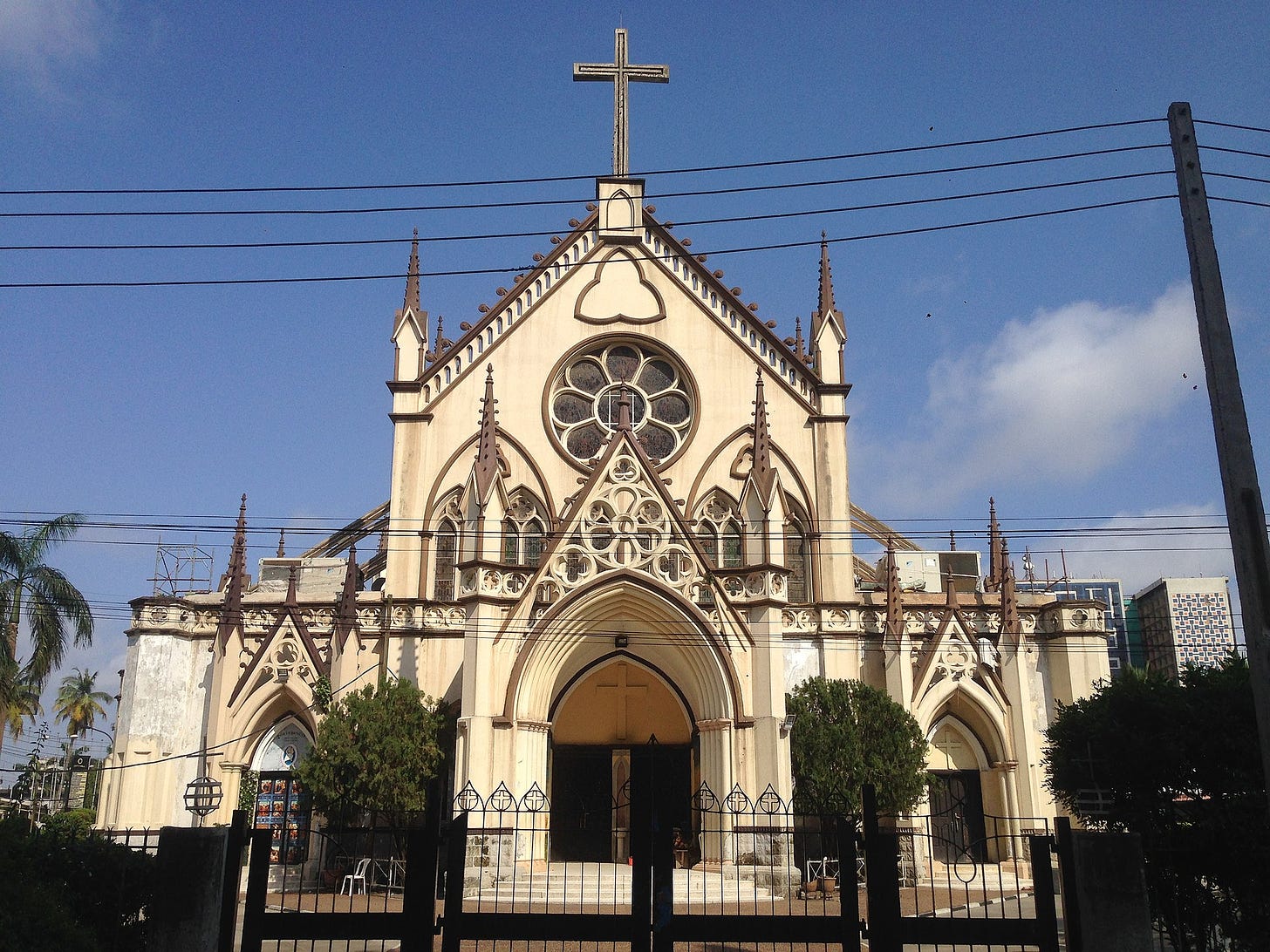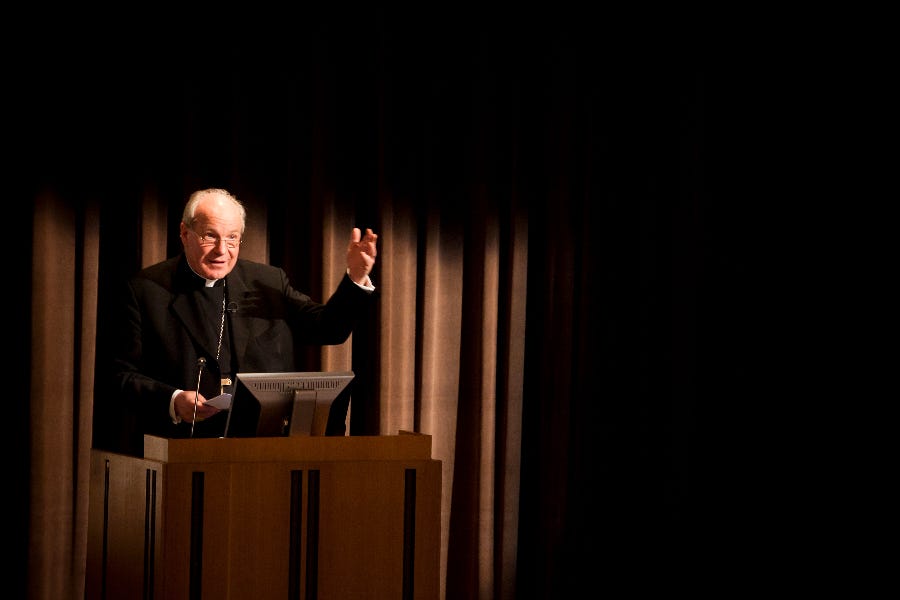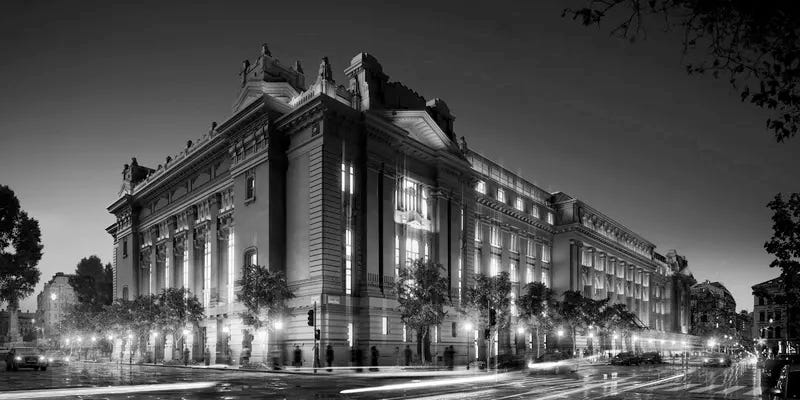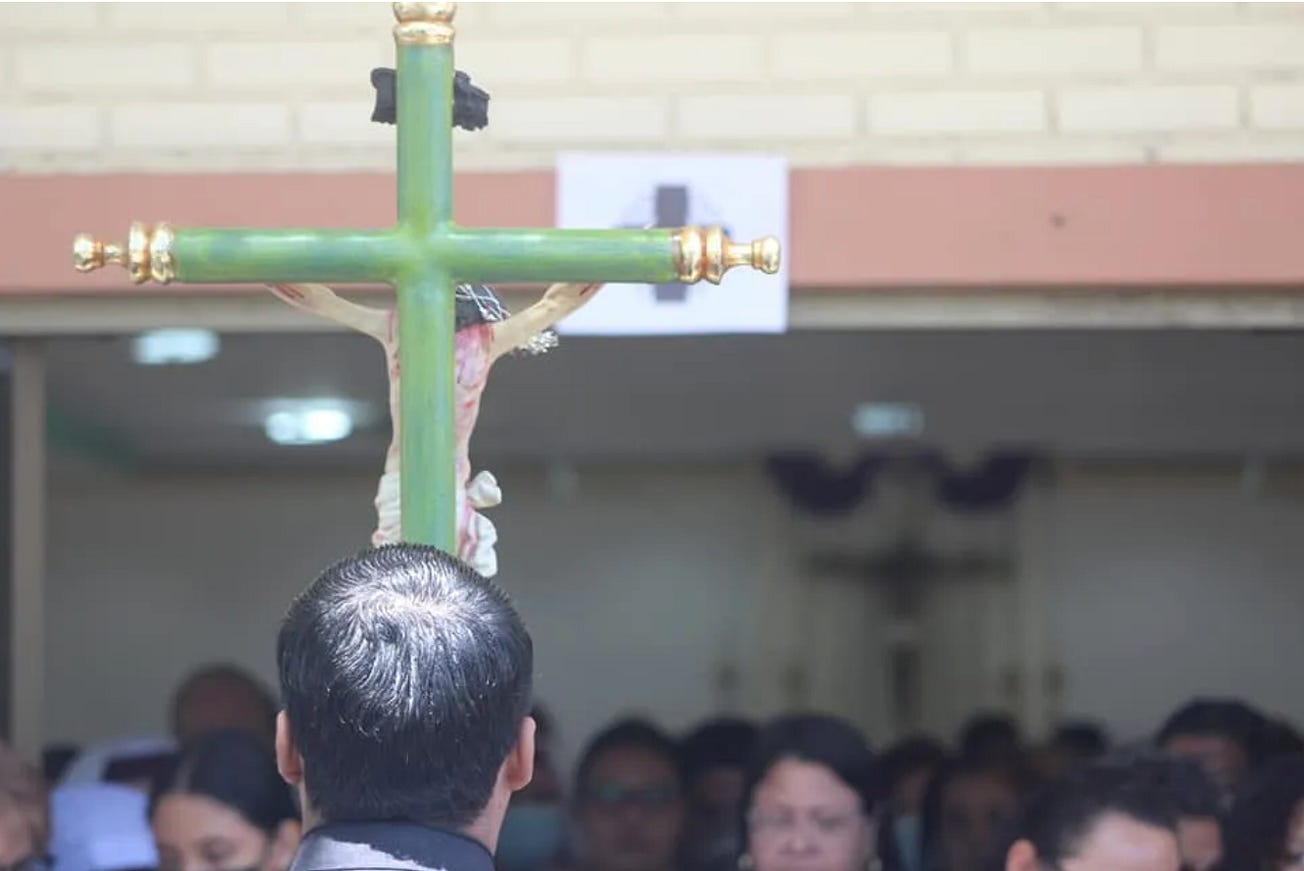Moremi* met Fr. Gabriel Ukhurebor when she was 16 years old.
She recalls that she went to confession with the priest, at her parish church in Lagos state, Nigeria, and he asked her to come talk in his office after the sacrament.
Ukhurebor offered her pastoral counseling, especially concerning abuse she had experienced earlier in her life, and they began to meet regularly, Moremi told The Pillar.
About a year after they met, Moremi remembers being in the priest’s office, talking about a celebrity crush she had. Out of the blue, the priest asked “And do you have a crush on me?”
Over the next five years, Moremi says she was groomed, manipulated, and abused by Fr. Ukhurebor — and that Church officials failed to take her experience seriously. While the priest was eventually removed from ministry, the Lagos archdiocese published false reasons for his departure, and it is not clear whether the priest will face a canonical process addressing the allegations, or if he will soon return to priestly ministry.
But back in Ukhurebor’s office, when the priest asked if he was her crush, Moremi was silent.
She didn’t know what she was supposed to say. She changed the subject, and she let it go. She had by then grown to trust Fr. Ukhurebor, and to spend time with him as a spiritual leader. He was, she remembers, almost a father figure to her.
Moremi remembers another moment, a few years later, when the priest noticed her bra strap was visible on her shoulder. He tried to fix it. Moremi didn’t like that.
“I was uncomfortable, and tried shrugging his hands off. He insisted. I was silent,” Moremi told The Pillar.
“At school, I kept thinking about it: ‘Was this appropriate or not? Were my boundaries crossed?’”
“I didn’t pay attention to that thought, afterwards, though. Maybe that incident wasn’t overt [enough] for me to be concerned about, then,” Moremi said. And, she added, “I wanted a father-daughter relationship so bad that I was willing to accept anything, sadly.”
In 2019, when they had known each other for about five years, things changed for the worse. Moremi was then a student, and she says that Ukhurebor helped her with money for textbooks, personal needs, medicine, and with cash. They were close, she thought.
In April 2019, Easter Monday, she says Ukhurebor invited her to eat at his rectory.
“I was eating at the dining [table], when he came towards me and planted a kiss on my lips.”
“It was too sudden for me to react, plus he left almost immediately,” Moremi told The Pillar.
Later that day, Moremi claims, the priest also asked her to show him how she was recovering from a skin condition on her back, which he had helped her purchase medicine to treat.
“I was very uncomfortable, as that meant I had to raise my shirt, and my bra straps would be seen. He insisted, saying ‘it was fine.’ I did raise my shirt, reluctantly, saying nothing.”
At home, Moremi says she texted Ukhurebor, “telling him how uncomfortable I was about that day, particularly the kiss. I was very polite, which is a sharp contrast of what I would have done if it was someone else. I think it was quite difficult to name what I was experiencing, because it was coming from him. I didn’t want to sound ungrateful.“
“He called me eventually. I was really nervous while speaking, expressing my displeasure. He minimized it. Gaslighted me. Told me he didn’t see it as anything. Made me feel like I was overthinking things. I believed him, sadly. I figured if Fr. Gabriel didn’t see this as anything, I shouldn’t too. He led, I followed…Took everything he said hook, line and sinker.”
They didn’t speak much more about that day, and their relationship continued.
Moremi said that about seven months later, in November or December 2019, the priest invited her to spend the weekend at his rectory, where he lived with other priests. She had spent the night there before. But this time, Moremi realized after she arrived that she was the only other person in the house.
And, she told The Pillar, Ukhurebor insisted she spend the night in his bed.
“I agreed eventually. I was uncomfortable, but didn’t know how to put my feet down and say no. As far as I could remember, nothing happened,” Moremi said. But the next day, she recalled, the priest began to ask her inappropriate sexual questions and touch her body inappropriately. Eventually she left.
She tried to talk with Ukhurebor, and told him she would not go to his rectory again. But when the priest told her he would never do anything to hurt her, she believed him. She wanted to cut off communication with him. But she said when he called one night to apologize for his behavior, telling her that he “went too far with things” but that “we have a special connection,” she believed him.
“At this point, it hadn’t occurred to me that I was being sexually abused. I didn’t have a name for it. I just knew I was uncomfortable, and was really triggered by those incidents. They were very similar to my previous abuse experiences,” she told The Pillar.
Eventually, the relationship resumed, and soon it led to a “sexual experience,” Moremi told The Pillar.
“I remember, he told me he was ‘proud of me,’” she said, after the encounter.
Moremi didn’t feel the same way.
“I was very distraught and felt really suicidal, several times. I tried pushing that awful experience to the back of my mind, and focused solely on school work. I had a conversation with this priest and I was treated like someone that he had just had a one night stand with. He used my personal struggles against me,” Moremi told The Pillar.
When Moremi began seeing a counselor, she said, she was finally able to name her experience: that she had been abused, manipulated, and assaulted.
The Church’s canon law establishes that it is a canonical crime for a priest to groom, manipulate, or coerce a person with whom he has a pastoral relationship into a sexual encounter. It is also a canonical crime - a very serious one - to use information gained in the confessional to harm a penitent, or to solicit some sexual contact.
Moremi didn’t know that when she contacted the Archdiocese of Lagos in the early months of 2020. But she did know she wanted to name her experience, and see it addressed. She said she spoke with an official of the Archdiocese of Lagos, who looked into the situation. Moremi says a woman hired by the archdiocese to investigate told her that “the allegations I made corroborated with what the priest said.”
Moremi also contacted police, although she said the pandemic and lockdowns have made following through with law enforcement very difficult.
Fr. Ukhurebor is a member of the St Patrick Missionary Society, a society of apostolic life begun in Ireland, but now headquartered in Kenya.
The society, Moremi was told, would be responsible for investigating the matter. When she was put in touch with the group, in March 2020, officials offered to pay for her counseling sessions, according to emails reviewed by The Pillar. After some deliberation, Moremi decided she didn’t want to take the money.
The group also told her that Ukhurebor would step down from his parish, be asked to undertake a “risk assessment,” and be sent for psychological counseling.
While a March 2020 letter sent to Moremi by Fr. Kevin O’Hara said the priest could face the possibility of laicization, it offered no further details. And in December 2020, the order told Moremi that the priest was on “holiday leave” after months in counseling. He would soon begin “a four month serious reflection on pastoral work and practices” before the order decided what to do next, O’Hara said.
Other than that, Moremi hasn’t heard much. She says she’s confused about the process, and she sometimes regrets making the report.
“I felt I wasted my time and their time. I was so sure I would be treated with so much dignity. Their response so far has been a rude shock to me.”
The St. Patrick Missionary Society acknowledged receipt of multiple emails from The Pillar, but did not respond to questions about the case.
But one former Vatican official involved in handling cases of clerical misconduct told The Pillar he was not surprised by Moremi's experience.
“Bishops in Nigeria and other African countries have been slow to respond to sexual abuse cases and have not given them the level of priority they have received elsewhere,” the official, who spoke on condition of anonymity, said.
If the Catholic Church in Nigeria has indeed been slow to address the problem of sexual abuse, it is not alone. According to local surveys, most Nigerians believe there is a high prevalence of rape in the country, but prosecutions are few, in part because alleged victims of sexual assault can be stigmatized for reporting their experience. Women accusing men of rape can even be sued for defamation, and some victims say police are rarely helpful in investigating claims.
In recent months, alleged victims have taken to social media to urge legal reform in the country.
The former Vatican official told The Pillar that he hopes the Church in Nigeria will be a leader in broad reform efforts. But to do that, he said, it needs to move forward with implementing its own policies.
And because priests in many parts of Nigeria are revered by Catholics, the country's bishops have a special responsibility to ensure that power is not abused, he added. And he noted that Pope Francis has been insistent about calling bishops to reform.
“Despite Pope Francis’ repeated calls for reform and for the need to address cases of clerical abuse in order to safeguard minors and all vulnerable persons, the Church leadership in Africa has failed to properly address even the gravest of violations.”
Moremi said that from her point of view, the Archdiocese of Lagos had certainly let her down.
She noted her shock in October 2020, more than six months after she reported abuse, when she discovered an article in the archdiocesan newspaper that said Fr. Ukhurebor had stepped down from his parish for further studies. The article said the parish had held a celebration for the priest. It praised him as “a hardworking and dedicated servant of God who puts in his very best in every task.”
The article did not mention her abuse allegation.
“I wish I never read that article,” Moremi told The Pillar. “It hurt me in ways I cannot describe. I remember sending an angry email to them, and they replied with the most stupid apology I had ever received. Like sorry was going to fix anything.”
When Moremi complained, Fr. O’Hara, of the Missionary Society of St. Patrick, wrote to her, saying the article was “misleading” and “inaccurate.”
“I am very sorry to hear of the hurt and pain you felt on seeing the article,” O’Hara wrote.
The article was not taken down or corrected. No acknowledgement was made of the allegation against Ukhurebor.
Fr. Vitalis Ezeigwe, a spokesman for the Archdiocese of Lagos, acknowledged in an email to The Pillar that its newspaper article was inaccurate.
“Indeed, there was an allegation of sexual misconduct against Fr. Ukhurebor which was promptly brought to the attention of his Superiors as a result of which he was immediately removed from ministry,” the spokesman told The Pillar this month.
“Fr. Ukhurebor is not in the country at the moment but he has NOT been sent for studies as stated in the publication you referred to,” he added.
As of Jan. 29, the article has not been taken down or corrected.
Ukhurebor could not be reached for comment.
While he did not address the charge that his archdiocese had misrepresented a priest accused of abuse, the spokesman told The Pillar that “in the Archdiocese of Lagos, a number of efforts have been made not only to address possible cases of sexual misconduct by the clergy, but also to prevent any from happening.”
He noted that the archdiocese has been working with the country’s bishops’ conference to “work out policies on the matter.”
There have been workshops and seminars in Nigeria on addressing clerical abuse and misconduct, Ezeigwe said. And the Archdiocese of Lagos expects to publish a policy manual soon.
“At the moment, the Archdiocese has concluded her work on a policy on safeguarding minors and vulnerable persons. The policy not only outlines the laws guiding professional conduct in ministry but also addresses processes in case of allegations of misconduct. This document has gone through a number of reviews and is at the point of being published,” the priest said.
Neither the archdiocese nor the Nigerian bishops’ conference provided copies of policies and protocols requested by The Pillar.
“The conclusion of the work with its publication has been significantly hampered by the pandemic and other local distractions in the country,” Ezeigwe told The Pillar.
The former Vatican official who spoke with The Pillar acknowledged that the Church in Nigeria is dealing with several serious problems, including frequent kidnappings of clergy by terrorist groups, and a problem that arises in several African nations, where priests living in concubinage become the fathers of children.
But the Church should not forget the serious issue of abuse, or ignore victims of clerical abuse, he said. He noted that even while protocols are being developed, the potential for abuse is created when safe environment policies and protocols are not implemented well or enforced, urging that as Nigerian dioceses build policies, they acknowledge the scope of the issue, and provide sufficient staff to ensure protocols are followed.
Moremi, noting that she felt manipulated when she reported her abuse, is skeptical about the archdiocese’s commitment to take policies seriously. She blamed “a flawed system incapable of handling this.”
“For months, I was so confident that the Church would validate my experience and treat it with so much respect. I was so confident.” Even when friends doubted that diocesan officials would help, Moremi said, “I was adamant. I was so sure.”
Moremi offered two suggestions for Nigerian church leaders making efforts for reform: “talk more about sexual abuse by clergy,” in a culture where such things are discussed in “hushed tones,” and “acknowledge and validate” the experience of victims.
But Moremi, now 23, said she is no longer looking to Church leaders for “for closure or fake apology.”
Instead, she said, with therapy, “I no longer blame myself. I think what helped me was a wonderful support system... Reading stories from other victims-survivors helped my healing journey, particularly snippets of the recent McCarrick report (God knows I couldn’t read the whole thing).”
“My goodness, those stories! Horrendous. I could resonate with them a whole lot. I’m liking therapy now. And I’m healing.”
As for her alleged abuser, Moremi was direct: “I believe that Gabriel Ukhurebor committed a crime, and I expect that it will be investigated and addressed by the police.”
*To protect her privacy and at her request, Moremi’s name has been changed.





